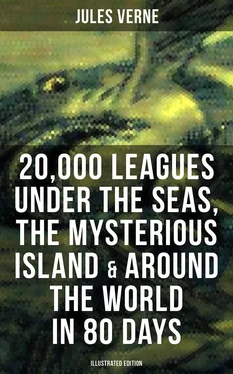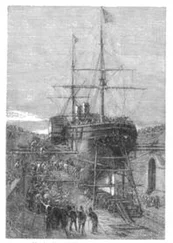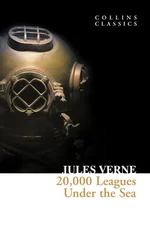Wearing caps made of sea-otter fur, and shod in sealskin fishing boots, these two strangers were dressed in clothing made from some unique fabric that flattered the figure and allowed great freedom of movement.
The taller of the two—apparently the leader on board—examined us with the greatest care but without pronouncing a word. Then, turning to his companion, he conversed with him in a language I didn’t recognize. It was a sonorous, harmonious, flexible dialect whose vowels seemed to undergo a highly varied accentuation.
The other replied with a shake of the head and added two or three utterly incomprehensible words. Then he seemed to question me directly with a long stare.
I replied in clear French that I wasn’t familiar with his language; but he didn’t seem to understand me, and the situation grew rather baffling.
“Still, master should tell our story,” Conseil said to me. “Perhaps these gentlemen will grasp a few words of it!”
I tried again, telling the tale of our adventures, clearly articulating my every syllable, and not leaving out a single detail. I stated our names and titles; then, in order, I introduced Professor Aronnax, his manservant Conseil, and Mr. Ned Land, harpooner.
The man with calm, gentle eyes listened to me serenely, even courteously, and paid remarkable attention. But nothing in his facial expression indicated that he understood my story. When I finished, he didn’t pronounce a single word.
One resource still left was to speak English. Perhaps they would be familiar with this nearly universal language. But I only knew it, as I did the German language, well enough to read it fluently, not well enough to speak it correctly. Here, however, our overriding need was to make ourselves understood.
“Come on, it’s your turn,” I told the harpooner. “Over to you, Mr. Land. Pull out of your bag of tricks the best English ever spoken by an Anglo-Saxon, and try for a more favorable result than mine.”
Ned needed no persuading and started our story all over again, most of which I could follow. Its content was the same, but the form differed. Carried away by his volatile temperament, the Canadian put great animation into it. He complained vehemently about being imprisoned in defiance of his civil rights, asked by virtue of which law he was hereby detained, invoked writs of habeas corpus, threatened to press charges against anyone holding him in illegal custody, ranted, gesticulated, shouted, and finally conveyed by an expressive gesture that we were dying of hunger.
This was perfectly true, but we had nearly forgotten the fact.
Much to his amazement, the harpooner seemed no more intelligible than I had been. Our visitors didn’t bat an eye. Apparently they were engineers who understood the languages of neither the French physicist Arago nor the English physicist Faraday.
Thoroughly baffled after vainly exhausting our philological resources, I no longer knew what tactic to pursue, when Conseil told me:
“If master will authorize me, I’ll tell the whole business in German.”
“What! You know German?” I exclaimed.
“Like most Flemish people, with all due respect to master.”
“On the contrary, my respect is due you. Go to it, my boy.”
And Conseil, in his serene voice, described for the third time the various vicissitudes of our story. But despite our narrator’s fine accent and stylish turns of phrase, the German language met with no success.
Finally, as a last resort, I hauled out everything I could remember from my early schooldays, and I tried to narrate our adventures in Latin. Cicero would have plugged his ears and sent me to the scullery, but somehow I managed to pull through. With the same negative result.
This last attempt ultimately misfiring, the two strangers exchanged a few words in their incomprehensible language and withdrew, not even favoring us with one of those encouraging gestures that are used in every country in the world. The door closed again.
“This is outrageous!” Ned Land shouted, exploding for the twentieth time. “I ask you! We speak French, English, German, and Latin to these rogues, and neither of them has the decency to even answer back!”
“Calm down, Ned,” I told the seething harpooner. “Anger won’t get us anywhere.”
“But professor,” our irascible companion went on, “can’t you see that we could die of hunger in this iron cage?”
“Bah!” Conseil put in philosophically. “We can hold out a good while yet!”
“My friends,” I said, “we mustn’t despair. We’ve gotten out of tighter spots. So please do me the favor of waiting a bit before you form your views on the commander and crew of this boat.”
“My views are fully formed,” Ned Land shot back. “They’re rogues!”
“Oh good! And from what country?”
“Roguedom!”
“My gallant Ned, as yet that country isn’t clearly marked on maps of the world, but I admit that the nationality of these two strangers is hard to make out! Neither English, French, nor German, that’s all we can say. But I’m tempted to think that the commander and his chief officer were born in the low latitudes. There must be southern blood in them. But as to whether they’re Spaniards, Turks, Arabs, or East Indians, their physical characteristics don’t give me enough to go on. And as for their speech, it’s utterly incomprehensible.”
“That’s the nuisance in not knowing every language,” Conseil replied, “or the drawback in not having one universal language!”
“Which would all go out the window!” Ned Land replied. “Don’t you see, these people have a language all to themselves, a language they’ve invented just to cause despair in decent people who ask for a little dinner! Why, in every country on earth, when you open your mouth, snap your jaws, smack your lips and teeth, isn’t that the world’s most understandable message? From Quebec to the Tuamotu Islands, from Paris to the Antipodes, doesn’t it mean: I’m hungry, give me a bite to eat!”
“Oh,” Conseil put in, “there are some people so unintelligent by nature …”
As he was saying these words, the door opened. A steward entered.* He brought us some clothes, jackets and sailor’s pants, made out of a fabric whose nature I didn’t recognize. I hurried to change into them, and my companions followed suit.
*Author’s Note: A steward is a waiter on board a steamer.
Meanwhile our silent steward, perhaps a deaf-mute, set the table and laid three place settings.
“There’s something serious afoot,” Conseil said, “and it bodes well.”
“Bah!” replied the rancorous harpooner. “What the devil do you suppose they eat around here? Turtle livers, loin of shark, dogfish steaks?”
“We’ll soon find out!” Conseil said.
Overlaid with silver dish covers, various platters had been neatly positioned on the table cloth, and we sat down to eat. Assuredly, we were dealing with civilized people, and if it hadn’t been for this electric light flooding over us, I would have thought we were in the dining room of the Hotel Adelphi in Liverpool, or the Grand Hotel in Paris. However, I feel compelled to mention that bread and wine were totally absent. The water was fresh and clear, but it was still water—which wasn’t what Ned Land had in mind. Among the foods we were served, I was able to identify various daintily dressed fish; but I couldn’t make up my mind about certain otherwise excellent dishes, and I couldn’t even tell whether their contents belonged to the vegetable or the animal kingdom. As for the tableware, it was elegant and in perfect taste. Each utensil, spoon, fork, knife, and plate, bore on its reverse a letter encircled by a Latin motto, and here is its exact duplicate:
MOBILIS IN MOBILI
Читать дальше












